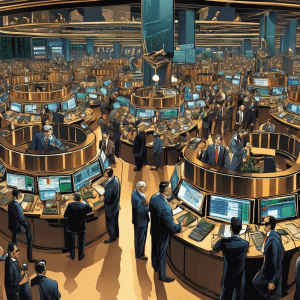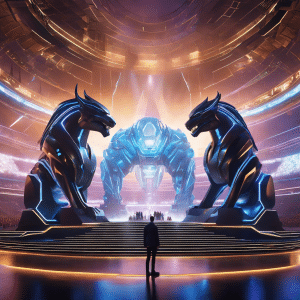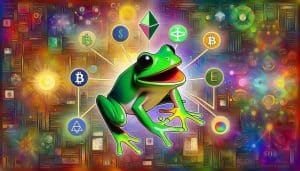Welcome to the world of token standards development in 2024, where innovation and collaboration are shaping the future of digital assets. As blockchain technology continues to evolve, the need for standardized tokens becomes increasingly important. In this article, we will explore the latest trends and advancements in token standards, and how they are revolutionizing various industries.
In today’s rapidly changing landscape, token standards play a pivotal role in enabling seamless interoperability and enhancing the efficiency of digital transactions. Whether you are a blockchain developer, a business owner, or simply curious about the potential of tokens, understanding the latest developments in token standards is crucial. From ERC-20 to ERC-721 and beyond, we will delve into the cutting-edge protocols that are driving the adoption of digital assets.
Join us as we dive into the exciting world of token standards development in 2024, and discover how these standards are shaping the future of finance, supply chain management, gaming, and more. From the rise of non-fungible tokens (NFTs) to the emergence of cross-chain compatibility, this article will provide you with valuable insights into the evolving token landscape. Get ready to unlock the potential of tokenization and stay ahead of the curve in this dynamic and transformative era.
The Importance of Token Standards
In the rapidly evolving world of blockchain technology, standardized tokens play a crucial role in enabling interoperability and improving the efficiency of digital transactions. These token standards provide a common framework and set of rules that ensure uniformity and compatibility across different platforms and applications.
By adhering to token standards, developers can create tokens that can easily interact with various wallets, exchanges, and smart contracts. This interoperability allows for seamless transfer of value and enhances the overall usability and functionality of blockchain-based systems.
One of the most popular token standards is ERC-20, which has become the industry standard for creating fungible tokens. With ERC-20, developers can easily create tokens that are interchangeable and can be traded on decentralized exchanges. This standard has paved the way for a wide range of use cases, from cryptocurrencies and stablecoins, to tokenized assets.
Another notable token standard is ERC-721, which is specifically designed for non-fungible tokens (NFTs). NFTs are unique digital assets that can represent ownership or proof of authenticity for art, collectibles, virtual real estate, and more. The emergence of ERC-721 has revolutionized the gaming industry and brought new opportunities for artists, creators, and collectors.
The importance of token standards extends beyond finance and gaming. In industries such as supply chain management, token standards enable the tracking and tracing of products, ensuring transparency and integrity throughout the entire supply chain. This can help in combating counterfeit goods, improving logistics, and enhancing consumer trust.
The importance of token standards cannot be overstated. They provide a foundation for seamless interaction and compatibility in the blockchain ecosystem. By adhering to these standards, developers can create tokens that are easily integrated with existing systems and can unlock new possibilities across various industries. Stay informed about the latest developments in token standards and be part of the transformative future of tokenization.
Overview of Token Standards
When it comes to blockchain technology, token standards play a crucial role in facilitating seamless interaction and interoperability among different digital assets. Token standards define the rules and protocols that govern the creation, transfer, and management of tokens on a blockchain. In simpler terms, they establish a common language that allows different blockchain networks to understand and work with each other.
One of the most prevalent and widely adopted token standards is ERC-20 (Ethereum Request for Comment 20). This standard defines the basic rules and functionalities for creating fungible tokens, which are interchangeable and identical to each other. ERC-20 tokens have gained immense popularity due to their utility in the finance and decentralized application (dApp) ecosystems. They have enabled the creation of cryptocurrencies, stablecoins, and utility tokens.
In contrast, ERC-721 (Ethereum Request for Comment 721) is a token standard that revolutionized the concept of non-fungible tokens (NFTs). Unlike ERC-20 tokens, NFTs are unique and indivisible, representing ownership and proof of authenticity for digital or physical assets. ERC-721 tokens have opened up new possibilities in various industries, such as gaming, art, and collectibles, allowing creators and collectors to tokenize and trade one-of-a-kind assets on the blockchain.
The development and adoption of token standards have had a profound impact on various sectors. In the financial industry, token standards have facilitated the creation of decentralized exchanges, lending platforms, and automated market makers, empowering individuals to have greater control over their finances. Throughout the gaming industry and art world, token standards have transformed the way artists monetize their work and collectors buy and sell rare digital assets. Moreover, in supply chain management, token standards have enabled improved transparency, traceability, and authentication of products, mitigating issues like counterfeit goods and enhancing consumer trust.
As the blockchain industry continues to evolve, it is crucial for individuals and businesses to stay informed about the latest developments in token standards. By keeping up with token standard advancements, you can gain a deeper understanding of the transformative potential of blockchain technology and explore new opportunities in various sectors.
Remember, the world of token standards is constantly evolving, and understanding their implications can be the key to unlocking the full potential of blockchain technology in the years to come.
ERC-20: The Gold Standard
When it comes to token standards in the blockchain world, there is one name that stands out above all others – ERC-20. Introduced in 2015 by Ethereum, ERC-20 has become the gold standard for creating and managing tokens on the blockchain.
ERC-20 defines a set of rules and protocols that allow for the seamless interaction and interoperability of tokens on the Ethereum network. It establishes a common set of functions that all ERC-20 tokens must implement, including the ability to transfer tokens, check balances, and approve token transactions. This standardization has played a crucial role in revolutionizing the finance and decentralized application (DApp) ecosystems.
The main advantage of ERC-20 tokens is their compatibility with existing infrastructure and wallets. Since they adhere to a uniform set of rules, ERC-20 tokens can be easily integrated into a wide range of platforms and applications. This has fueled the rapid adoption of ERC-20 tokens in various industries, including crowdfunding, loyalty programs, and asset-backed securities.
Moreover, ERC-20 tokens have democratized funding opportunities through Initial Coin Offerings (ICOs). By creating their own ERC-20 tokens, startups and projects can raise capital from a global investor base without the need for intermediaries. This has unlocked new possibilities for entrepreneurs and investors alike.
The widespread use of ERC-20 tokens has also fueled the development of a vibrant ecosystem of decentralized exchanges (DEXs) and token wallets. These platforms provide users with easy access to a wide range of ERC-20 tokens, facilitating seamless trading and storage.
As the blockchain industry continues to evolve, ERC-20 remains at the forefront of token standards. Its versatility, compatibility, and widespread adoption make it the go-to choice for token creators and developers. However, it is important to stay informed about the latest developments in token standards, as new solutions may emerge that overcome the limitations of ERC-20 and offer even greater functionalities.
So, whether you are a developer looking to create your own tokens or an investor interested in the burgeoning world of decentralized finance, understanding and leveraging ERC-20 is essential. It is the gold standard that has paved the way for the tokenization revolution and continues to shape the future of blockchain technology. Stay tuned for more updates and innovations in the world of token standards.
Beyond ERC-20: Exploring Other Token Standards
While ERC-20 remains the dominant token standard in the blockchain space, it is important to be aware of other emerging token standards that offer unique functionalities and features. The continuous development of the blockchain ecosystem has given rise to new token standards that aim to address the limitations of ERC-20 and cater to specific use cases. Exploring these alternatives can provide valuable insights and opportunities for developers and investors.
One notable token standard that has gained traction is ERC-721. Also introduced by Ethereum, ERC-721 enables the creation of non-fungible tokens (NFTs). Unlike ERC-20 tokens, which are interchangeable and have the same value, NFTs represent unique and indivisible assets. This has opened up new possibilities in the world of digital art, collectibles, gaming, and real estate. NFTs have gained significant attention and have witnessed high-value transactions, showcasing the potential of this token standard.
Another emerging token standard is ERC-1155. This standard, also developed by Ethereum, combines the features of ERC-20 and ERC-721. It allows for the creation of both fungible and non-fungible tokens within the same smart contract, providing greater flexibility and efficiency. ERC-1155 is particularly useful in scenarios where multiple token types are needed, such as in-game assets, digital marketplaces, and decentralized finance protocols.
Furthermore, there are other blockchain platforms that have introduced their own token standards. For example, Binance Smart Chain has the BEP-20 token standard, which is similar to ERC-20 but supports lower transaction fees. Additionally, Polkadot has the ERC-20 compatible token standard called ERC-20 Parachain Tokens, which allows for interoperability between different blockchains within the Polkadot network.
As the blockchain space continues to evolve, new token standards will emerge, each addressing specific needs and use cases. Being aware of these alternatives can provide opportunities for innovation and investment. Developers and investors should stay informed about the latest token standard developments and explore how these new solutions can enhance their projects or portfolios.
Remember, staying informed about token standards beyond ERC-20 is crucial to unlock new possibilities and stay ahead in the rapidly evolving world of blockchain technology.
Token Standards in Finance, Supply Chain Management, and Gaming
In the fast-paced world of blockchain technology, token standards play a crucial role in driving innovation and enabling compatibility across various sectors. Let’s explore how token standards are shaping the future of finance, supply chain management, and gaming.
Finance
Token standards have revolutionized the finance sector by introducing new and efficient ways of transferring, storing, and managing assets. The ERC-20 token standard, for example, has played a significant role in the growth of decentralized finance (DeFi). With ERC-20 tokens, it’s now easier than ever to create and trade cryptocurrencies, issue tokens for fundraising purposes, and participate in tokenized investment opportunities.
As the finance industry continues to embrace blockchain technology, we can expect the emergence of more specialized token standards tailored to specific financial use cases. For instance, the ERC-223 standard improves upon ERC-20 by addressing some of its drawbacks, such as the risk of losing funds when sending tokens to the wrong smart contract.
Supply Chain Management
Token standards are also making waves in the realm of supply chain management. By leveraging blockchain technology and tokenization, businesses can enhance transparency, traceability, and efficiency in their supply chain processes.
The ERC-721 token standard, known for its uniqueness and indivisibility, has gained popularity in supply chain management. With ERC-721 tokens, every item in a supply chain can be represented as a unique token, allowing for provenance tracking, anti-counterfeiting measures, and efficient inventory management.
Furthermore, emerging token standards like ERC-1155 are pushing the boundaries of supply chain management by allowing the creation of semi-fungible tokens. This innovation opens up possibilities for representing fractional ownership, licensing, and complex supply chain relationships.
Gaming
The gaming industry has embraced token standards as a way to enhance player experiences, enable asset ownership, and create decentralized economies within games. With the rise of blockchain-based games, players can truly own and trade in-game assets, blurring the line between the virtual and real worlds.
Token standards like ERC-721 and ERC-1155 have found significant use cases in gaming. These standards allow for the creation and exchange of non-fungible tokens (NFTs), which represent unique and easily verifiable digital assets. These assets can range from collectibles and virtual real estate to in-game items and characters with distinct properties.
Conclusion
Token standards have emerged as a driving force behind innovation and compatibility in the blockchain industry. By facilitating seamless interactions and transactions, these standards have transformed finance, supply chain management, and gaming.
In the realm of finance, token standards like ERC-20 have revolutionized decentralized finance (DeFi), simplifying the creation and trading of cryptocurrencies, tokenized fundraising, and investment opportunities. This has opened up new avenues for individuals to participate in the digital economy.
In supply chain management, token standards such as ERC-721 and ERC-1155 have enhanced transparency, traceability, and efficiency. They enable provenance tracking, anti-counterfeiting measures, and streamlined inventory management, ensuring greater trust and integrity within supply chains.
Token standards have also made a significant impact on the gaming industry. ERC-721 and ERC-1155 have empowered players to truly own and trade in-game assets, blurring the boundaries between virtual and real worlds. This has led to the creation and exchange of non-fungible tokens (NFTs) representing unique digital assets.
As we look ahead to 2024, it is clear that token standards will continue to shape the future of blockchain technology. Their versatility and adaptability will enable further innovation and transformation across various sectors, paving the way for a more decentralized and interconnected world. Embracing these standards will be essential for businesses and individuals seeking to leverage the full potential of blockchain technology.
Frequently Asked Questions
What role do token standards play in blockchain technology?
Token standards play a crucial role in driving innovation and enabling compatibility across various sectors in the world of blockchain technology.
How have token standards revolutionized decentralized finance (DeFi)?
Token standards like ERC-20 have revolutionized decentralized finance (DeFi) by making it easier to create and trade cryptocurrencies, issue tokens for fundraising, and participate in tokenized investment opportunities.
What benefits do token standards bring to supply chain management?
Token standards like ERC-721 and ERC-1155 enhance transparency, traceability, and efficiency in supply chain management by allowing for provenance tracking, anti-counterfeiting measures, and efficient inventory management.
How do token standards impact the gaming industry?
Token standards like ERC-721 and ERC-1155 enable players to truly own and trade in-game assets, blurring the line between the virtual and real worlds. They have found significant use cases in gaming, allowing for the creation and exchange of non-fungible tokens (NFTs) representing unique digital assets.








